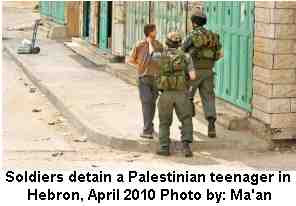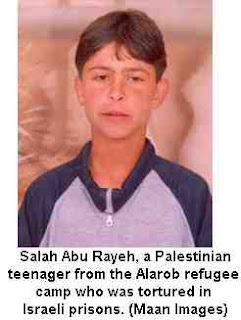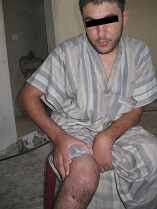The shooting of Hasan below and the continued incarcertation and physical abuse, amounting to torture, of Palestinian children as young as 13/14, is tolerated by the Western media who hear, say and see nothing. Of course if it was Hamas….
The article below that relates to Israel’s treatment of Palestinian children in general, including its imprisonment of them, its beatings and shackling of them, which we have covered before.
Name: Hasan W.
Date of Incident: 22 May 2010
Age: 17 Location:
The Gaza Strip, Occupied Palestinian Territory
Nature of Incident: Shot whilst collecting building material On 22 May 2010, a 17-year-old boy is shot in the leg whilst collecting building material in the Gaza Strip, 300 metres from the border fence with Israel.
Seventeen year old Hasan lives with his parents and seven brothers and sisters in Jabalia, a town in the north of the Gaza Strip, close to the Erez Checkpoint with Israel. Hasan dropped out of school in the seventh grade ‘because I wasn’t good enough and couldn’t pass my classes’ and struggles to find work in Gaza where a severe physical and economic blockade has been imposed by Israel since at least June 2007.
The family’s economic situation is bleak. ‘My father sells gas containers,’ says 17-year-old Hasan, ‘but he has little work because of the gas shortage caused by the blockade. He only works a few days a month, and the money he makes barely meets the needs of our ten-member family.’ In February, Hasan heard about a job opportunity from his cousin, where he could earn between 30 and 50 NIS per day (US $8 to 13) collecting gravel near the border with Israel and used for building material. Although modest, this income was desperately needed by the family. ‘We don’t have much gravel in Gaza because Israel doesn’t allow the entry of construction materials, so I decided to go there. I would wake up everyday at dawn, prepare the donkey cart, and later sell the gravel for 3 NIS (US $0.80) a bucket to the people trading in construction materials,’ recalls Hasan.
On Saturday, 22 May 2010, Hasan went as usual to the industrial zone to collect gravel with his cousin. ‘Many other youngsters and children were working in the same area with us,’ remembers Hasan. ‘There were around 100 workers or even more. Israeli soldiers were observing us from the watch tower on the border, and would sometimes fire bullets in the air or at us, or at the donkeys. Sometimes they actually shot the donkeys.’ At around 6:30am, Hasan heard a gun shot. ‘I was collecting gravel with the other workers about 300 metres from the border fence, when one of the Israeli soldiers in the watch tower fired a shot which hit me in the right leg. I immediately fell to the ground in great pain. Everyone started running away, except for one youngster who I didn’t know, who came and tried to help me, but he couldn’t lift me.’ In the meantime, the soldiers kept firing and the boy who came to help Hasan also had to run away.
‘I stayed on the ground for about 15 minutes whilst my leg was bleeding,’ recalls Hasan, ‘then my cousin arrived and took me to the main street in his donkey cart.’ Soon afterwards an ambulance arrived and rushed Hasan to Kamal Odwan Hospital, where his wound was treated and his shattered leg was placed in plaster. ‘My leg was in plaster for two months,’ says Hasan, ‘and now I still can’t walk properly and feel pain whenever I move it. I don’t know when I will be able to walk again, and I know I won’t be able to go back to collecting gravel, even though my family needs the money, and there are no other alternatives.’
According to the UNDP and the Palestinian Central Bureau of Statistics, during the first half of 2009, the youth unemployment rate in Gaza for 15 to 19 year-olds reached 57.5 percent.
September 2, 2010
According to the Palestine Section of Defense for Children International, each year, about 700 Palestinian children from the West Bank are prosecuted in Israeli military courts. Out of 100 sworn affidavits collected by lawyers in 2009, 69% of the children were beaten and kicked, 49% were threatened, 14% were held in solitary confinement, 12% were threatened with sexual assault, including rape, and 32% were forced to sign confessions written in Hebrew, a language they do not understand. Israel’s treatment of detained Palestinian children is considered to be torture by the United Nations under international law.
Al-Awda, The Palestine Right to Return Coalition calls on all its members, supporters and people of conscience to contact the White House to demand that the Obama administration direct the Israeli leadership to immediately release and end to the systematic and institutionalized abuse of all Palestinian children in Israeli prisons in accordance with international law. The US government, which supports Israel to the tune of billions of taxpayer dollars a year while most ordinary Americans are suffering in a very bad economy, is bound by its laws to cut off all aid to Israel until it ends all of its violations of human rights and basic freedoms in a verifiable manner.
To contact the White House, please use the online form at Alternatively write to:
President Barack Obama The White House 1600 Pennsylvania Avenue NW Washington, DC 20500 Phone : 202-456-1414 Fax: 202-456-2461
Letters in the US may be faxed online via: To contact your Representatives and Senators, go to: members can be reached through the Capitol switchboard toll free at: 1-877-331-2000 Please cc your correspondence to [email protected]
Al-Awda, The Palestine Right to Return Coalition PO Box 131352 Carlsbad, CA 92013, USA Tel: 760-918-9441 Fax: 760-918-9442 E-mail:
Al-Awda, The Palestine Right to Return Coalition (PRRC) is the largest network of grassroots activists and students dedicated to education and advocacy for the restoration of Palestinian human, national, legal, political and historical rights in full with particular emphasis on the right of Palestinians to return to their homes and lands of origin from which they have been dispossessed since 1948. PRRC is a not for profit tax-exempt educational and charitable 501(c)(3) organization as defined by the Internal Revenue Service (IRS) of the United States of America. Under IRS guidelines, your donations to PRRC are tax-deductible.
To donate, go to and follow the instructions. To become a member, go to
By Amira Hass
The way the army and police treat Palestinian minors arrested in the West Bank is the focus of complaints filed recently with both Israeli legal authorities and the United Nations.
The Palestinian branch of Defence for Children International (DCI ) has taken affidavits from dozens of minors who have been arrested. According to DCI-Palestine Section, the minors’ testimonies describe a policy of routine and painful abuse, involving various forms of physical and psychological pressure, in order to extract confessions from minors in custody.
The Association for Civil Rights in Israel and Yesh Din, two Israeli rights groups, say the provisions of the relevant military laws play a major role in the abuse perpetrated on imprisoned Palestinian minors. Both groups sent a letter to Military Advocate General Avichai Mendelblit in June with recommendations for changes in this law.
On August 15, DCI and an Israeli organization, the Public Committee Against Torture in Israel, filed two complaints alleging cruelty and sexual abuse of A.M., a 15-year-old from the village of Beit Ummar, near Hebron. A.M. was arrested by soldiers on May 26. He was questioned and held for five days, then released after he admitted to having thrown stones. His testimony was reported by Haaretz on June 10.
During A.M.’s remand hearing on May 30, attorney Iyad Misk claimed the teenager had been both sexually and physically abused.
The judge, Lt. Col. Avshalom Meushar, responded that “there was no evidence in the [case] file” to support this claim. “The substance of the confession made by the suspect, and the detailed nature of his answers, constitute evidence that the answers he gave were not provided under pressure or torture, but of his own free will,” the judge added.
The teen claimed that at the time of his arrest and while he was being transported to the Etzion lock-up, the soldiers hurt him in various ways. He also said his confession to the police interrogator was extracted by torture and sexual threats.
A spokesman for the police’s Shai (Samaria and Judea ) District told Haaretz at the time that the minor’s allegations conflicted with the evidence in his case file. During his testimony to the police investigator, the spokesman said, the minor did not complain that any violence had been used against him.
An Israel Defense Forces spokesman said at the time that an investigation would be launched into the soldiers’ conduct. Two months after the report in Haaretz, the Military Advocate General’s Office finally sought testimony from A.M. But the meeting, scheduled for this week, did not take place, because the MAG representative refused Misk’s request that the boy’s testimony be given with his attorney present.
In their letter of complaint to Attorney General Yehuda Weinstein and attorney Herzl Sbiro, who heads the Justice Ministry department responsible for investigating police misconduct, DCI and the Public Committee Against Torture asked for a criminal investigation to be launched against the person who questioned A.M. The organizations wrote that A.M. had told them the investigator attached an electric cable to the boy’s genitals and threatened to give him an electric shock unless he confessed to throwing stones.
The two groups also wrote to Lt. Col. Sigal Mishal Shehori, who is in charge of operational affairs for MAG. In that letter, they demanded a criminal investigation into the conduct of the officers and soldiers involved in A.M.’s arrest. A.M. said the soldiers abused and laughed at him while he was handcuffed in a painful position.
“Many complaints are received by the Committee [Against Torture] regarding abuse by soldiers and violence against Palestinian prisoners,” the letter said. “This suggests the existence of a serious and widespread practice of violence and abuse of Palestinian prisoners by soldiers.”
“This violent and systematic behavior was described extensively in a report published by the Public Committee Against Torture in Israel more than two years ago … to show you that a clear policy to contain the phenomenon of abuse of prisoners by IDF soldiers must be instituted,” it added.
In both letters, the authors asked that an attorney be allowed to be present while giving testimony to MAG or Justice Ministry investigators, as it is natural for minors to feel frightened and threatened by interrogators who are part of the same military system that arrested them.
Meanwhile, on August 3, DCI sent details on the case of S.A., another 15-year-old from Beit Ummar, to the UN special rapporteur on torture.
Both the teenager and soldiers who witnessed the incident say he was used as a human shield when security forces entered his village on April 16, at a time when an event was taking place in the village to mark Palestinian Prisoner Day.
The soldiers allegedly forced the teenager to march in front of them so they would not be hit by stones thrown by local youths.
S.A. said the soldiers demanded that he confess to having thrown stones, beat him and forced him to drink tainted water that made him vomit. The story was reported by the Palestinian news agency Maan, which also reported that the IDF spokesman had said the case would be investigated.
Since September 2009, DCI has given the UN details of more than 100 cases in which the military authorities allegedly abused minors who were held in detention.
Many of the Palestinian minors are brought before a military judge when they are already scared and exhausted as a result their incarceration, often after having been arrested in the middle of the night. They are then tried on the basis of a military law that, even after it was slightly changed last year, “seriously violates the rights of minors and contravenes the protection they must be given in criminal proceedings,” according to ACRI and Yesh Din.
In a June 15 letter to the MAG’s office, they requested certain changes to improve the situation, including treating Palestinians as minors until the age of 18 (as Israelis are ) rather than 16, and refraining from imprisoning Palestinians under the age of 14.
The IDF Spokesman’s Office said in response that after S.A. and A.M. are questioned by the Military Police, the findings will be delivered to the military advocate general. ACRI’s request was received by the MAG on August 16, it added, and will studied thoroughly.
The military prosecution has recently received a number of requests relating to the legal status of minors held in West Bank military courts, the statement continued, and “these requests are currently being examined by all the relevant bodies, including the Justice Ministry.”



